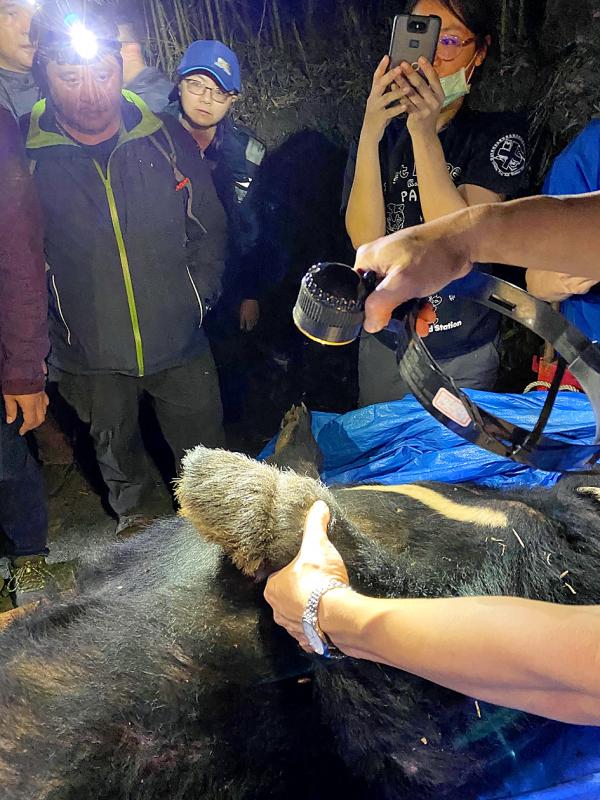The government should help people manage risks posed by wild animals, bear expert Hwang Mei-hsiu (黃美秀) said yesterday, after a Formosan black bear was caught in a trap twice in less than two months, possibly the fourth time it has been trapped.
In October last year, the bear, later codenamed No. 711, was rescued from a trap by the Dongshih Forest District Office. It was treated, fitted with a tracker and released to the wild on Taichung’s Dongmao Mountain (東卯山) on Dec. 3.
However, the office on Saturday found via the tracker that the bear had not moved since the night before and sent a team to investigate.

Photo courtesy of Dongshih Forest District Office
The team found the bear caught in a trap in a bamboo grove and sent it back to the Endemic Species Research Institute Low Altitude Experimental Station in Taichung for treatment and relocation.
Based on the animal’s scars, it was likely the fourth time it has been caught in a trap meant to ensnare macaques or wild boars, Hwang said on Facebook.
Some people believe that bears should not enter the low-elevation mountains in Taichung, as it is densely populated, but it is actually farmland interspersed with forest that is 1km above sea level, she said, adding that based on No. 711’s activity, the bear spends most of its time in uninhabited areas.
Formosan black bears require a broad territory without much human interference, she said.
Since bears are highly intelligent opportunists, the best way to prevent them from becoming a nuisance is to stop giving them positive reinforcement in the form of food, she said.
Hwang recommended that the office “use satellite positioning during the day to devise a strategy and deploy a team, clear human food from the area, and after nightfall hold the line and step up intermittent harassment.”
Authorities must look out for potential hazards to wildlife, as well as assist the public in dealing with potential damage wrought by wild animals to make sure that traps targeting other animals, such as macaques or wild boars, do not accidentally ensnare black bears, she added.
Based on her correspondence with older residents of Taoyuan’s Taoshan Village (桃山), where bear No. 711 had been stealing food, Hwang said that people are relatively tolerant of black bears.
However, some people are afraid of them and lack sufficient knowledge, so without education about how to manage the threat, residents have failed to notify authorities or take appropriate measures, such as clearing food or pruning vegetation around farmland, to prevent black bear encroachment, she said.
“This is likely the first case of human-bear conflict that has gained considerable attention from people, conservation groups and the media,” Hwang said. “I hope the authorities will communicate with the public in a professional, wise and patient manner to create a beneficial balance between humans and bears, and establish a model for Formosan black bear conservation.”
“This place is our traditional land, but it is also the black bears’ traditional land,’” Hwang quoted a resident as saying. “This understanding is the precondition for living and thriving together.”

The Grand Hotel Taipei on Saturday confirmed that its information system had been illegally accessed and expressed its deepest apologies for the concern it has caused its customers, adding that the issue is being investigated by the Ministry of Justice Investigation Bureau. The hotel said that on Tuesday last week, it had discovered an external illegal intrusion into its information system. An initial digital forensic investigation confirmed that parts of the system had been accessed, it said, adding that the possibility that some customer data were stolen and leaked could not be ruled out. The actual scope and content of the affected data

‘LIKE-MINDED PARTNER’: Tako van Popta said it would be inappropriate to delay signing the deal with Taiwan because of China, adding he would promote the issue Canadian senators have stressed Taiwan’s importance for international trade and expressed enthusiasm for ensuring the Taiwan-Canada trade cooperation framework agreement is implemented this year. Representative to Canada Harry Tseng (曾厚仁) in an interview with the Central News Agency (CNA) said he was increasingly uneasy about Ottawa’s delays in signing the agreement, especially as Ottawa has warmed toward Beijing. There are “no negotiations left. Not only [is it] initialed, we have three versions of the text ready: English, French and Mandarin,” Tseng said. “That tells you how close we are to the final signature.” Tseng said that he hoped Canadian Prime Minister Mark Carney

POSITIVE DEVELOPMENT: Japan and the US are expected to hold in-depth discussions on Taiwan-related issues during the meeting next month, Japanese sources said The holding of a Japan-US leaders’ meeting ahead of US President Donald Trump’s visit to China is positive news for Taiwan, former Japan-Taiwan Exchange Association representative Hiroyasu Izumi said yesterday. After the Liberal Democratic Party’s landslide victory in Japan’s House of Representatives election, Japanese Prime Minister Sanae Takaichi is scheduled to visit the US next month, where she is to meet with Trump ahead of the US president’s planned visit to China from March 31 to April 2 for a meeting with Chinese President Xi Jinping (習近平). Japan and the US are expected to hold in-depth discussions on Taiwan-related issues during the

President William Lai (賴清德) yesterday bestowed one of Taiwan’s highest honors on Saint Vincent and the Grenadines (SVG) Ambassador Andrea Clare Bowman in recognition of her contributions to bilateral ties. “By conferring the Order of Brilliant Star with Grand Cordon on Ambassador Bowman today, I want to sincerely thank her, on behalf of the Taiwanese people, for her outstanding contribution to deepening diplomatic ties between Taiwan and SVG,” Lai said at a ceremony held at the Presidential Office in Taipei. He noted that Bowman became SVG’s first ambassador to Taiwan in 2019 and